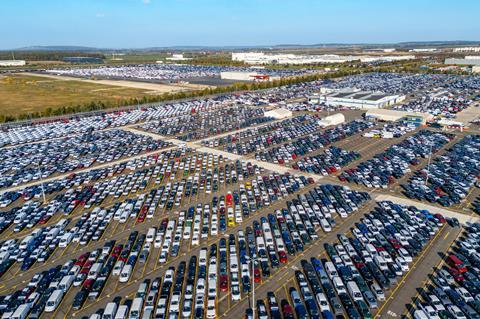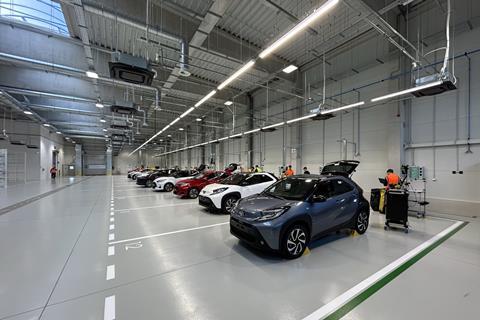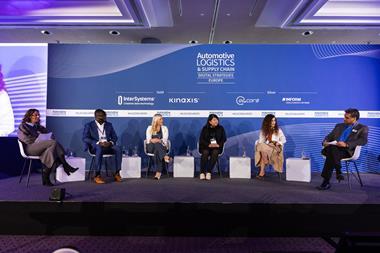Toyota Motor Europe’s (TME) new €17m ($18m) mega hub in Kolín, Czech Republic, now processes up to 350,000 vehicles annually, streamlining pre-delivery customisation. With integrated rail links, the hub also helps TME reduce carbon emissions, supporting its sustainability goals over previous logistics models.
Toyota Motor Europe (TME) has invested €17m ($18m) in a vehicle distribution hub outside the town of Kolín in the Czech Republic capable of processing up to 350,000 vehicles a year. It is the largest Toyota vehicle distribution facility in Europe.

The hub, which is on the same site as TME’s assembly plant in Kolín, has extensive rail links and will serve Austria, Czech Republic, Germany, Hungary, Poland and Slovakia, reducing vehicle waiting times for both Toyota and Lexus customers, according to the carmaker.
“The inauguration of our mega hub in Kolín marks a significant milestone in our logistics strategy,” said Jean-Christophe Deville, vice-president of supply chain at TME. “This facility sets a new benchmark in vehicle logistics by ensuring best-in-class operations that deliver on time, in time and every time.”
TME said the mega hub will improve accessorisation quality and provide more efficient pre-delivery services, including customisation, which is currently carried out at the dealerships. Toyota will be directly employing staff for management and accessory installation operations, while yard operations, pre-delivery inspection and pre-delivery services will be provided by Ceva Logistics. Ceva is also providing finished vehicle transport services, alongside other finished vehicle logistics providers including CAT Group and STVA.
“Pre-delivery services reduce the need for dealers to process/work on the vehicles,” said a spokesperson for TME. “They are shipped ready to be handed over to the final customer.”
Toyota said it continues to deliver vehicles to the dealer network at the moment, though there is a growing trend toward an agency model of distribution among European carmakers looking to cut the delivery costs and seek alternative methods of selling and delivering their products. With the agency model, rather than visit a showroom and negotiate a deal on a vehicle, the customer places an order via a virtual showroom directly with the OEM for a fixed price and names a preferred delivery location in the dealer network or opts for home delivery. The price and dealership mark-up or commission is set by the OEM.

In terms of sustainability, TME said the rail links at Kolín will help it meet its goals of decarbonising the outbound delivery of vehicles. The carmaker is delivering more vehicles by rail using existing rail connections between its manufacturing facilities in the Czech Republic, France and the UK. Since 2022 TME reports saving more than 4,200 tonnes of carbon emissions per year. The carmaker said an additional rail connection with Poland, close to where it is making Proace Max, will further contribute to reduce carbon emissions by around 1,100 tonnes per year.
There is currently disruption to rail freight services in Europe, particularly in Germany because of overdue and lengthy repair work to the network, but Toyota said it is navigating any shortage in capacity by using spot trains, shortsea vessel services for the UK flows and ordering extra rail wagons.
“We are dedicated to fostering innovation, efficiency and sustainability through this significant investment, ensuring that we deliver exceptional value to our customers and contribute positively to the local economy,” said Dr Robert Kiml, president of Toyota Motor Manufacturing Czech Republic.


























![Global[1]](https://d3n5uof8vony13.cloudfront.net/Pictures/web/a/d/s/global1_726550.svgz)













No comments yet